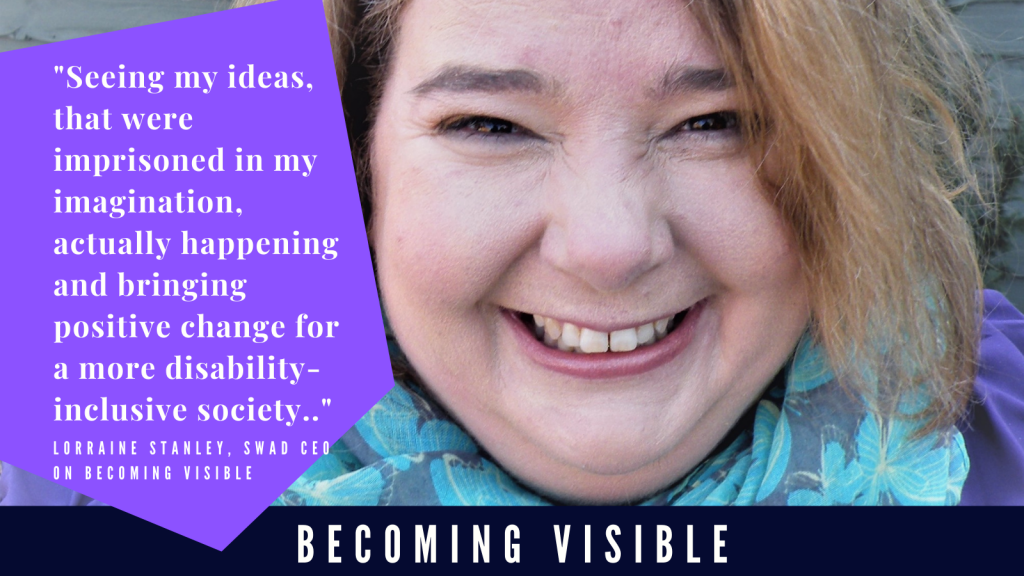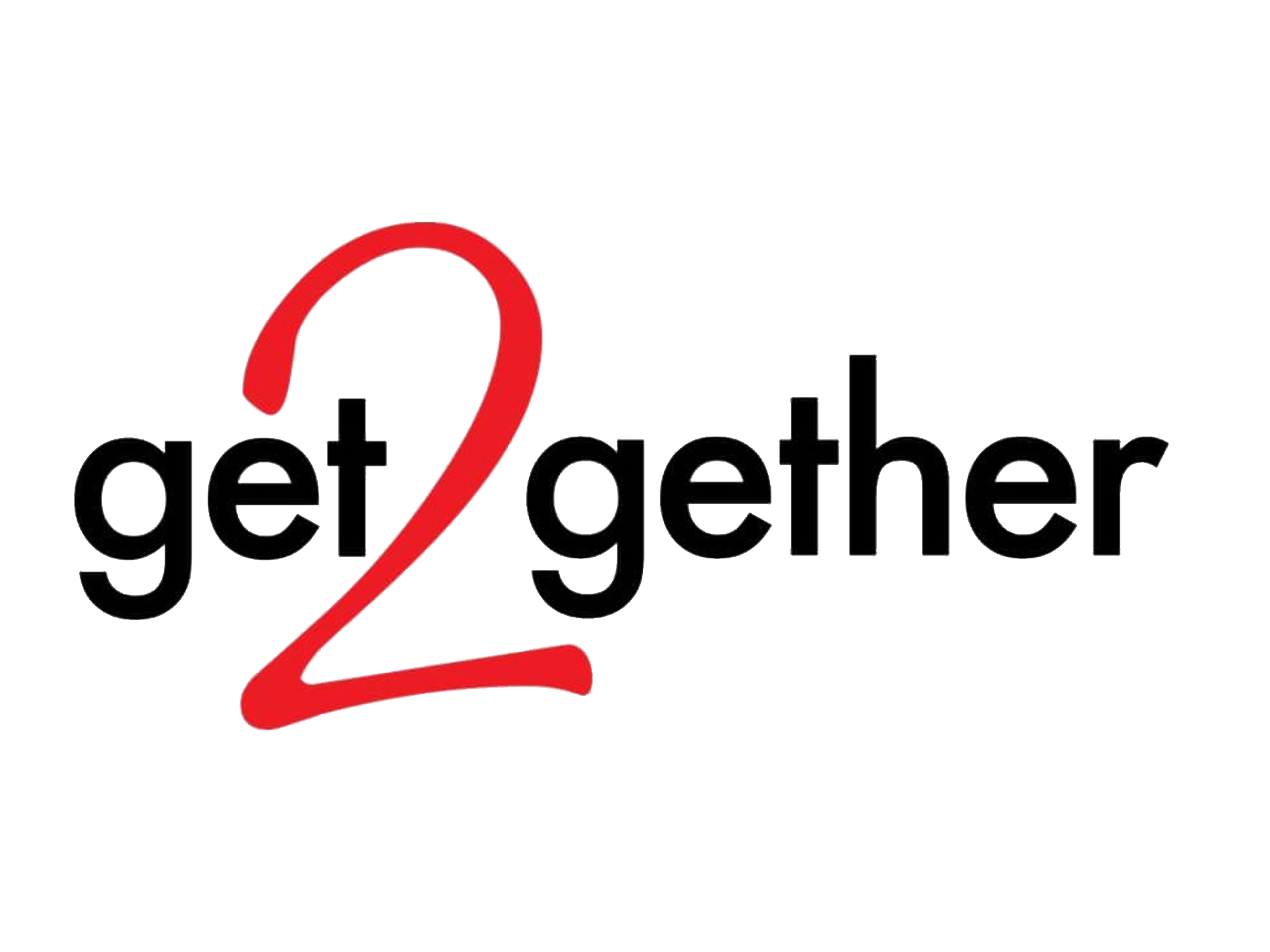Lorraine (SWAD) is #BecomingVisible

This week’s blog series is focusing on the “Let’s talk about sex” series – a set of workshops where our members can explore topics around intimate relationships and sexuality. Since 2019, we have been working with Crew200 to deliver this work and in 2021 get2gether is partnering with SWAD. Our team has been chatting with Lorraine Stanley, CEO of SWAD.
Hello Lorraine, welcome, and thanks for agreeing to take part in our #BecomingVisible campaign. What does becoming visible mean to you?
To me, becoming visible means seeing my ideas, which were imprisoned in my imagination, actually happening and bringing positive change for a more disability-inclusive society.
Why do you think is it important to have people with disabilities in leadership roles, doing the work around sexual expression?
Thanks for inviting me – I feel like I have found my tribe! I am very excited to do this work with people that are interested in disability and sexual expression.
I really like the term ‘sexual expression’, as it covers everything around sexuality – from how one might express their sexual orientation to all different types of sex. From who you fancy and who you date, to things like kink and swinging – sexual expression covers it all!
The ability to have a hug, cuddle and caress (if you fancy it!), or have solo sex, is a basic human right and these personal relationships are integral to our lives.
I think there are fantastic disability allies and supporters who are really important for an individual. Yes, it is me that is driving SWAD forward, but the practical support of other people and access to technology are a key part of that.
If you have a disability, or are integral to the life of someone who has a disability, you understand the frustration that faces us, and lived experience of the inequalities that still exist. As an example, new buildings with steps instead of ramps, but also the lack of changing places toilets – things like this, are really important.
Having said that, I think there should definitely be more going on in regards to speaking up about the inequalities when it comes to sexual expression. Thankfully, we are seeing more people who are becoming confident at speaking out for themselves on this subject.
We know that not all disabilities are visible, but seeing people who are visibly disabled has encouraged me (and others) that I can do the same. I have listened to people with a wide variety of disabilities speaking about their own challenges. We now see more people with disabilities on TV – people with Down’s Syndrome and autism that are featuring in mainstream shows – that feels like they are opening the world up for people with disabilities. It highlights that if that person can get a job as an actor, at least you are aware that might be an option for you.
Where sex is concerned, I feel passionately that people with disabilities have the right to their sexual expression and there are ways we can demand this!
This is something that you do through your work at SWAD – can you tell us a little bit about your organisation?
SWAD stands for “Sex With A Difference” – the difference bit relates to disability, but it also refers to lesbian, gay, trans or any other part of the rainbow of ways a person expresses their sexuality. We know that there is a great need to discuss sexuality, especially for people who the general population might assume might not be interested in having sex.
It is almost thinking that a disabled person is asexual. As much as there probably are disabled people who are asexual – we also know that there are many who are interested in finding ways that sexual expression would work for them, so the difference also refers to alternative lifestyles, like kink, swinging and other forms of sexual expression.
The main focus for me is that I want sexual expression to be recognised as an activity of daily living. I want this to be recognised within personal care needs assessment across the board. This includes from the local council, to the DWP, as well as support agencies. As soon as it is recognised on those levels, then things can start changing for people.
I used to work in training teams, both within the NHS and my local council, and there were standards that we had to meet as an organisation. There were also key performance indicators we had to meet – if it hadn’t got KPI attached to it, it fell off the edge. The good news is that things are changing in this landscape at the moment. The Care Quality Commission now highlights the expectation that a care provider has to have a sexuality policy and also support their residents and provide training for staff, – and if they don’t, they will be marked down. This is another reason why I think there is a new interest in this area. People are starting to get it and the fact that they have done that I think this has done a HUGE positive service to the disabled community.
Is this the case since the pandemic? Has COVID been helpful for seeing some of those changes?
The past year has been the most inclusive year of my adult disabled life, it has been amazing!
The fact that for regular meetings that used to happen, there was the assumption that you will travel places. For somebody like me, travel is a major barrier, not to mention the lack of toilet facilities! So yes, during the pandemic it has meant that we as a community have been able to get involved in all different levels and see how things are run by local government – more networks have sprung up.
If lockdown hadn’t happened, would the LoveAbilities Sexuality & Disability Festival have happened? Covid made working from home an acceptable business practice and it levels up the playing field. I was so self-conscious about the fact that I was lying down during Zoom meetings, but it only took me about 3 zoom calls to get over it – does it matter? If people are interested in what I have to say, it shouldn’t matter where and how I attend the meetings. In fact, recently I had some really lovely bits of feedback about how refreshing it is to see somebody in bed, working!
We are so excited to announce our collaboration for an event you are hosting at get2gether – what can our members expect?
We are going to start with a general introduction as to how SWAD came to be. We will be looking at the Care Act under the point of wellbeing – that is within legislation, expectation in law that the principle of wellbeing needs to be met – organisations are often not meeting this.
We will also do a couple of scenarios on how to support your staff and what options we can do to address things – that will give people a taster of how SWAD would approach this. It is something that people forget – as disabled people we come across some bizarre situations, and there are plenty of funny and/or ridiculous moments.
Join Lorraine from SWAD at the “Let’s talk about sex” event on the 18th March, 3.30 – 4.30, and explore ways of how to support your staff. To sign up, email office@get2gether.org.uk
